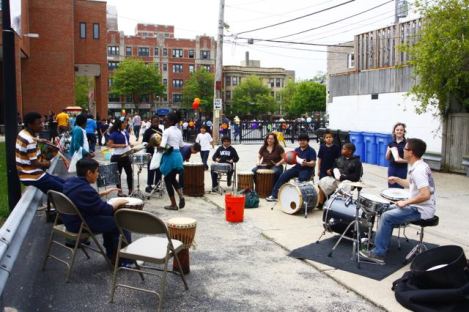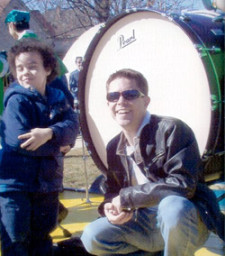Urban Gateways teaching artist Michael Riendeau will be playing with his jazz trio, The Second Hand Three, during the cocktail hour at Urban Gateways’ Art for All Gala on March 30. Michael, a percussion artist, holds a BA in Music and French from Lawrence University and has studied music in France and West Africa. Here, he shares his thoughts on jazz, teaching in Chicago schools, and his own childhood arts experiences.
I believe that many students have the inspiration in them; music is part of who they are. It’s a matter of giving them a voice, and tools. It’s like having access to a library. You need to be literate, and then that world is open to you.
Can you explain what type of performance your group offers in general, and what you’ll be doing at our Art for All Gala more specifically?
Our performance [at the Gala] will include keyboard, upright acoustic bass, and a small, compact drum set. We play a lot from the standard jazz songbook, with our own interpretation of the pieces. We also have some originals we’re working on, all using a traditional jazz approach.
What is your group’s vision or mission?
Thinking about the way that jazz can be perceived in modern society… I think it’s exonerated as this high art form, and people think that if you’re cool or sophisticated you’ll appreciate it, so it’s almost removed from a real experience. We try to place this music in the now, in modern society. Our mission is to make it accessible.
For how long and in what capacities have you been involved with Urban Gateways?
The trio has been together for the past 3 years, and we played at the UG Gala two winters ago. I’ve been with the organization [as a teaching artist] since spring of ‘07. I teach three Urban Gateways residencies right now, at St. Angela’s on the west side, Sherman School of Excellence on the south side, and I just started at EPIC Academy.
Why do you choose to collaborate with Urban Gateways?
It helps me to explore my art. My students and I create new sounds and rhythms that inspire me and thrill me. These are not just my students, but my collaborators. Also, for the students drums can be such an outlet. Certain students really find something there, something they’re good at. This isn’t always the case—some students struggle. But for a few of my students, it has become a part of who they are. Now they identify as drummers.
As for Urban Gateways in general, the professional development that they provide to us as teaching artists is so refreshing. I remember doing the new artist orientation, and being in this room looking at an Emerson poem, discussing it from every angle, and feeling like I was in a small English class. It was so exciting. I remember feeling stimulated in that environment, and I hadn’t felt that in so long. It was awesome to find a community of artists and an organization to support that community.
Riendeau drums with students at the Greeley Elementary street festival.
What do you remember about arts experiences in your childhood? Any particular moments of artistic exposure that influenced you strongly?
I always listened to music from very early on. My dad was a trumpet player, and I had a musical older brother, too. As for choosing drums, I had a science class in second grade where they asked us to build an instrument. I was going to make a guitar with a pie tin, but my dad said, why not a drum? So we made this awesome-sounding drum, and that’s where it started.
Then in fifth grade I had a music teacher whose husband taught at a high school nearby. He was in percussion studies, and he taught with the Boston Symphony. My music teacher saw promise in me and a few other student drummers, so her husband came after school to work with us. Later on I decided that I needed to really study this stuff seriously, which led me to study music in college, France, West Africa…
Why do you support UG’s mission – that is, equitable access to arts education and igniting creativity in all young people?
We can call this art, but I feel like it’s more. It’s such a part of the fabric of our communities, our interactions. Music is so much a part of what we do, and how we are in life. It doesn’t only exist in a particular class–it’s everywhere, in every pocket of the socioeconomic structure. It’s something human, part of our condition and our expression. I’m giving people a language for that, a way to access and develop it. I believe that many students have the inspiration in them; music is part of who they are. It’s a matter of giving them a voice, and tools. It’s like having access to a library. You need to be literate, and then that world is open to you.


